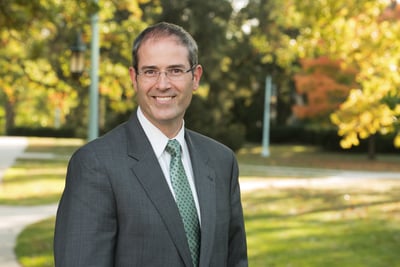Faculty voice: On ethical candor
Christopher P. Long is the dean of the College of Arts and Letters. The following faculty voice is repurposed from the Long View Blog on the College of Arts and Letters website.
There is a line from Seinfeld that cuts to the heart of the distinction between sincerity and ethical candor. In a desperate attempt to beat a polygraph machine, Jerry turns to George, a practiced liar, for advice. As Jerry gets up to leave, George offers this:
Sincerity requires earnest belief, even if what is believed is untrue. One can actively assent to a lie one tells oneself. Ethical candor, however, is conscience bound to truth. Self-deception is the opposite of ethical candor, the cultivated disposition to be honest with yourself. At the depth of human conscience is an inviolable connection with truth. We can deceive ourselves in the face of that truth, we can choose to believe the lies we tell ourselves, and we can affect the deepest sincerity as we convey the lie we have decided to believe. But duplicity of conscience is impossible. Truth has a quiet insistence, and quietude is required to hear it.
Contemporary life, however, is harried, filled with distractions that allow self-deception to take root and grow. The human capacity for self-deception is as debilitating as it is dangerous; debilitating because it hinders us from living in alignment with our deepest selves, dangerous because it corrodes our capacity to love.
In the "Brothers Karamazov," Dostoevsky emphasizes the connection between self-deception and love when he has Father Zosima tell Fyodor Karamazov:
Our contemporary political landscape is littered with the same appalling sincerity of which Baldwin speaks. Eddie Glaude, Jr. fleshes Baldwin’s position out further in his own language: "Our sincere commitments to democracy have always been shadowed by the lie evident in our practices. Sincerity, ostensibly, requires that we not mislead or deceive ourselves or others — that we at least, seek to be true to ourselves... Panic ensues when crises reveal the truth, because we are snatched from our fantasies and forced to confront who we are."
The COVID-19 pandemic is a crisis that reveals the deepest truths about who we are as a nation. It is an apocalypse, that is to say, an uncovering that has forced us into a space of quietude in which we might pause, reflect and begin to consider how, for all our American sincerity, we have failed to confront the racism, oppression, and violence that haunts our democracy.
As Brittany Cooper insists: "We can neither heal nor fix that which we will not confront." Confronting the incoherence between the values of liberty and justice for which we say we stand and the unjust realities the current pandemic has rendered undeniable is the work white Americans specifically are called upon to undertake in this period of reckoning. We must confront with ethical candor our own racism and the racism operating in the systems that privilege us.
In undertaking this reckoning now, we cannot succumb to the panic of which Baldwin speaks. It is necessary, rather, to cultivate ethical candor with courage and intention, to engage in practices of critical self-reflection and to hold our actions accountable to the insistent truth we encounter in intimate dialogue with our conscience in our deepest moments of quietude.
